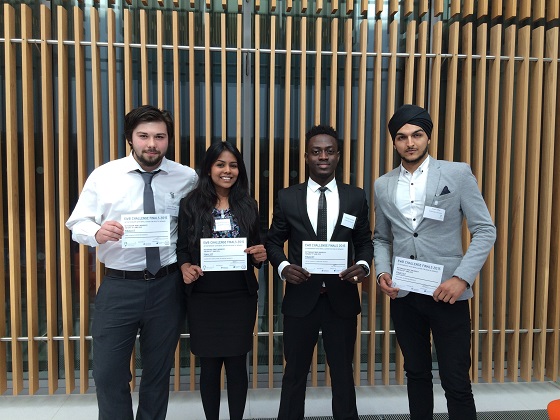High-flying Engineering students from De Montfort University Leicester (DMU) have reached the finals of a national competition on their first attempt.

The group – Sharon Suresh Kumar, Henry Spencer, Aman Sihra and Michael Akindele – were chosen as one of 25 finalists for the Engineers Without Borders Challenge 2015.
The competition aims to equip the new generation of engineers with the skills and knowledge required to address global challenges in their professional careers.
This year, EWB teamed up with Nepal Water for Health (NEWAH) to challenge students to address different design areas facing households and communities in Nepal.
RELATED NEWS:
* See the facilities for Mechanical Engineering - book a place on our Open Day
* Future engineers charged with inspiration after track day
* Brazilian Mechatronics student takes his Lego robot to compete in Vienna
DMU’s team designed a set of windows which could be built by householders to help clear smoke, provide a light source, insulate the house in harsh weather and keep out pests.
Some 125 entries were received for the 2015 challenge from universities across the UK and the DMU team’s idea reached the finals.
“We researched houses in Nepal and they have very very small windows and there’s a lot of pollution from cooking,” explained Mechanical Engineering student Sharon, the team leader. “Design engineering is about using similar existing solutions and tailoring it to the current needs.
“Our solution is cheap, easy to construct and works perfectly for the situation - which is what was the primary requirement.”
The team looked at locally available and sustainable building materials and came up with a design using wood from the black palm tree which can easily be grown in gardens.
This had an added benefit of being able to create products by weaving together the palm fronds which could generate extra income for the community.
The team also included a step by step guide to building the window frames which cost £18 for four and researched whether the Nepalese government could make grants available for communities to build them.
Although the DMU team were narrowly pipped to the post, the judges were impressed with the level of work they had put in to consider the community impact.
Leticia Ozawa-Meida, who teaches the project management module for the course, said: “Overall, the feedback was very good. The judges were particularly positive about the community aspect and the work the students had done.
“I’m really proud of them. This is the first time we have entered the competition so to reach the finals first time around was amazing.”
Team co-leader Henry Spencer added: “The project was run as part of our project management module, and it was nice to have this module linked to a real project.
“Being able to apply yourself as an engineer to any project is important, and designing creative solutions that really could make a difference in somebody’s life is very rewarding and exciting.”
Posted on Thursday 30 July 2015